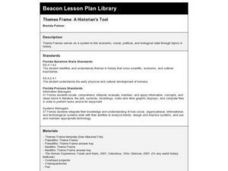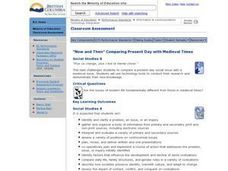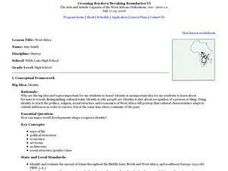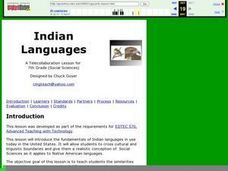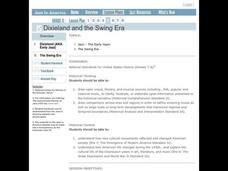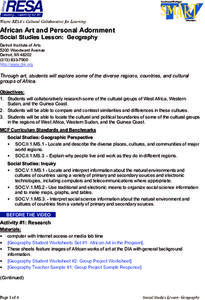Curated OER
Themes Frame: A Historian's Tool
Students research the scientific, economic, and cultural themes that connect Paleolithic and Neolithic inhabitants. They complete Paleolithic and Neolithic Theme Frames, comparing/contrasting the two cultures in an essay or Venn diagram.
Curated OER
The Sands of Arabia
Sixth graders apply geographic information to the study of World History. In this Geography instructional activity, 6th graders create a political/physical map of the Middle East, develop questions and answers about the culture of the...
Curated OER
"Now and Then" Comparing Present Day with Medieval Times
Eighth graders compare a present-day social issue with a medieval issue. They use technology tools to conduct their research and demonstrate their new knowledge. Students present their findings to the class in the form of a PowerPoint.
Curated OER
Doorways/Printmaking
Students are introduced to the techniques used in printmaking along with the relief method and tessellation relationships to art. In groups, they examine a variety of architecture used throughout the Islamic culture. To end the lesson,...
Curated OER
Our Compromise, Our Constitution
Sixth graders explore, analyze and study our constitutional government and become aware of the purpose of our government. They assess the basic rights that are protected by the United States Constitution through graphic organizers and...
Curated OER
Jazz In America - Lesson Plan 8
Fifth graders explore the current jazz scene and how it reflects American culture. They listen to jazz recordings of current artists and speculate on which direction jazz is likely heading.
Curated OER
Minorities in a Cross-Cultural Perspective Debate Simulation Case Study: China's Borderlands
Twelfth graders investigate if minority status is synonymous with powerlessness in China. They examine if minority and majority groups interact with equity and justice in China. Students present their findings in a debate-simulation format.
Curated OER
Solving the Puzzle
Students create a map showing the United States borders at a specific period in history and produce three questions to be answered by examining the map. They also write a productive paragraph explaining who, what, when, where, how/why a...
Curated OER
U.S. and Canada: How are We the Same? How are We Different?
Get high school geographers to compare and contrast Canada and the United States. They begin by drawing a freehand map of North America, then complete readings to gain insight into Canada. The text is not provided; however, another text...
Curated OER
Jazz in America
Students explore Free Jazz and Fusion by answering questions and listening to music.
Curated OER
Jazz In America - Lesson Plan 6
Fifth graders explore cool jazz and how it reflected American culture in the 1940's and 1950's.
Curated OER
Constructing a Timeline of African History
Young scholars create a timeline of African History. In groups, they research and describe eight different important periods in the country's history. They apply this information to compare and contrast them and how it has allowed...
Curated OER
Indian Languages
Fifth graders explore the different types of Indian languages used today in the United States.
Curated OER
Jazz in America
Students explore the Swing Era and its implications. They answer questions and listen to music from the era.
Curated OER
Jazz in America
Students learn where Jazz came from and why it is an important part of America's history.
Curated OER
Eminent Domain: Whose Land is it Anyway?
Students research eminent domain and whether or not there has been a land dispute in their community. Students search local newspapers, local history books or talk with civic leaders and long-time citizens and create a chart showing the...
Curated OER
Where is ? ? ? ?
Students explain and explain the concept of a grid system. They define absolute and relative location and develop an imaginary city on graph paper using a grid system.
Curated OER
We Live in an International Community
Learners locate the different countries from which their clothing originates. Using a blank map, they identify and color in those areas.
Curated OER
Jazz in America
Students explore jazz and its origins by focusing on the people in which Jazz came from.
Curated OER
Jazz in America
Pupils explore the Jazz of today and its future. They answer questions and listen to music.
Curated OER
Geography
Students work together in groups to research the cultural groups of West Africa, Sudan and the Guinea Coast. They compare and contrast each culture and locate the political and cultural boundaries on a map.
Curated OER
Historical Atlas
Sixth graders evaluate how revolutions have affected the world throughout history (i.e. boundaries of nations, culture, economics, etc...) through the research for and creation of a historical atlas for assigned countries.
Curated OER
Regions of the United States
Middle schoolers research maps in order to propose geographic reasons for geographic patterns such as state boundaries, interstates and elevations.
Curated OER
Japan and Art
Learners discuss the art of Japan as it relates to Japanese culture and geography and then create individual postcards reflecting the information learned from the lesson. This lesson includes possible enrichments.


